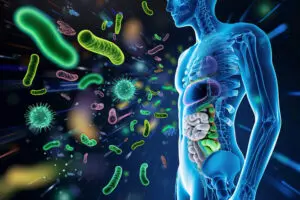By Ross Pelton, RPh, PhD, CCN
Scientific Director, Essential Formulas
“All disease begins in the gut” is attributed to the ancient Greek physician/philosopher Hippocrates approximately 2,500 years ago. Scientific studies on the human gut microbiome are increasingly reinforcing the correctness of this fundamental concept. The gut microbiome is genuinely a master regulator of health and immunity for the entire body.
An Epidemic of Epidemics
The United States is currently experiencing an epidemic of chronic degenerative (non-genetic) diseases. We have an epidemic of heart disease, cancer, diabetes & metabolic syndrome, IBS, IBD, arthritis, osteoporosis, Alzheimer’s disease, ADHD, autism…and there are others. The rates of many of these diseases are also escalating in other countries around the world.
The burden of gastrointestinal problems in the United States has reached near epidemic levels. It’s reported that 1 out of every 5 visits to a doctor (20%) are for gastrointestinal complaints.i
The incidence of childhood neuropsychiatric disorders such as ADHD and autism have also continued to rise at alarming rates during the past several decades. For example, data from the National Health Interview Survey reported that in 1997-1998, 6.1% of US children were diagnosed with ADHD. In 2015-2016, the incidence of ADHD had increased to 10.2%.ii
In the 1970s, the rate of autism in the U.S. was less than three children per 10,000. In the 1990s, the incidence of children with autism exploded with more than a 10-fold increase to over 30 children per 10,000.iii
Could there be a link between the increased incidence of gastrointestinal problems and the escalating rates of ADHD and autism? Also, could probiotics improve conditions in the microbiome ecosystem, which could result in reducing the risk of developing disorders such as ADHD and autism?
For the past several years I have been educating people about the association between gut problems and brain problems. Now scientists are starting to make the association between leaky gut and leaky brain.iv Intestinal permeability allows inflammation-producing substances to pass into systemic circulation. This results in brain inflammation which causes the blood-brain barrier to become “leaky” and allows toxins to enter the brain.
For decades, scientists and physicians have been looking for “what’s gone wrong,” in the brain of kids diagnosed with autism or ADHD. Research is revealing these conditions are culprits of poor gut health. For example, in one review 43% of children with autistic spectrum disorder (ASD) were found to have mucosal damage and intestinal permeability compared to placebo controls.v An increasing number of studies are also being published that link altered gut microbiome and gastrointestinal symptoms with ADHD.vi
Dr. Ohhira’s Probiotics has developed a world-wide reputation for its ability to rapidly create improvements in people with dysbiosis. Recent research reported that Dr. Ohhira’s Probiotics contain over 400 postbiotic metabolites. Dr. Ohhira’s is a complete microbiome system that contains probiotic bacteria, prebiotic foods and postbiotic metabolites. However, it is the postbiotic metabolites in Dr. Ohhira’s that immediately begin to create change by reducing inflammation, attacking pathogens, accelerating the growth of healthy new cells in the lining of the GI tract and reestablishing healthy gut-brain communication. This is, “The Dr. Ohhira’s Difference!.” Dr. Ohhira’s Probiotics is the best product to rapidly improve conditions in the microbiome ecosystem in children with autism or ADHD. A good gut creates a great mind!
These diseases were very low or virtually unheard of 200 to 300 years ago. Why is the health of humanity declining so rapidly? Could it be based on changes in the human gut microbiome?
Bacteria were the first life forms to emerge on earth approximately 3.5 billion years ago. Subsequently, bacteria have been regulating the health and the life of every plant, insect, animal, and human since these higher lifeforms began to emerge and evolve on earth.
Dysbiosis
Dysbiosis is the term that refers to a disruption of the microbiome and the resulting symptoms of intestinal disturbance. In addition to antibiotics, other classes of drugs that disrupt the microbiome include antacids and acid-suppressing medications, NSAIDs, statins, opioids, oral contraceptives, metformin, some antipsychotics, and most chemotherapy drugs. Also, other factors that contribute to dysbiosis include high rates of Cesarian section births, highly processed, fiber-deficient foods, exposure to pesticides and herbicides, and vitamin D deficiency.
Global microbiome dysregulation, or dysbiosis, results in a worldwide decline in the health of animals, humans, and the environment. Studies are increasingly linking gut microbiome dysbiosis with a wide range of health problems such as various forms of cancer, inflammatory bowel diseases, cardiovascular disease, obesity, autoimmune and nervous system diseases, allergic diseases, Alzheimer’s disease, and dementia.i,ii,iii
Good health and dysbiosis cannot co-exist; good health is not possible when an individual has dysbiosis. Dysbiosis results in intestinal inflammation and the development of intestinal permeability (leaky gut), which can cause or contribute to any of the previously listed diseases.
Analysis of 2,000-Year-Old Gut Microbiome
Recently scientists were able to conduct a genomic analysis of the gut bacteria of well-preserved feces of human remains from 1,000 to 2,000 years ago. This study, titled Reconstruction of ancient microbial genomes from the human gut, was published in the May 12, 2021 issue of the respected journal Nature.iv
The researchers conducting this analysis reported finding numerous strains of gut microbes that are new to science. They also found many bacterial strains in the fossilized human remains that are absent in the gut microbiome of humans today.
Ancient cultures consumed a much more diverse range of foods that contained a much more significant amount of dietary fiber and a much greater diversity of different kinds of dietary fiber. Quantity and variety of dietary fiber are critical for developing and maintaining a healthy, diverse microbiome. As modern industrialized societies have transitioned to “grocery-store” diets containing added sugars and highly processed foods, many of the nutrients and fibers required to support a healthy microbiome are lost.
Another disturbing finding from the study on the ancient fecal matter is that the gut microbiome of people currently living contains vastly greater numbers of antibiotic-resistant bacteria than our ancient ancestors.
Missing Microbes
Martin Blaser is a world-renown microbiome scientist and physician who wrote a book titled Missing Microbes.v In his book, he states that the overuse of antibiotics is fueling our modern plagues because they do significant damage to the gut microbiome and contribute to the loss of many species of gut bacteria.
Prescription for Good Health
To create and/or maintain good health, people must take proactive steps to maintain a healthy gut microbiome. This involves
- Avoiding the dietary, environmental, and lifestyle factors that disrupt the gut microbiome.
- Maintaining serum vitamin D levels in the range of 50-60 ng/ml
- Consuming a diversity of different fiber-rich foods every day, which will support the growth and proliferation of your innate bacteria.
- Taking Dr. Ohhira’s Probiotics daily, which directly delivers probiotics, prebiotics, and over 500 postbiotic metabolites. Some of the ways postbiotic metabolites help maintain a healthy microbiome include reducing inflammation, inhibiting the growth of harmful bacteria, enhancing the immune system, preventing and/or helping to repair intestinal permeability and gut barrier function.
Be kind to your gut microbiota because they are among the most critical factors in regulating your overall health.
References:
i Perry AF, et al. Burden of Gastrointestinal Disease in the United States: 2012 update. Gastroenterol. 2012 Nov;143(5): 1179-1187.






